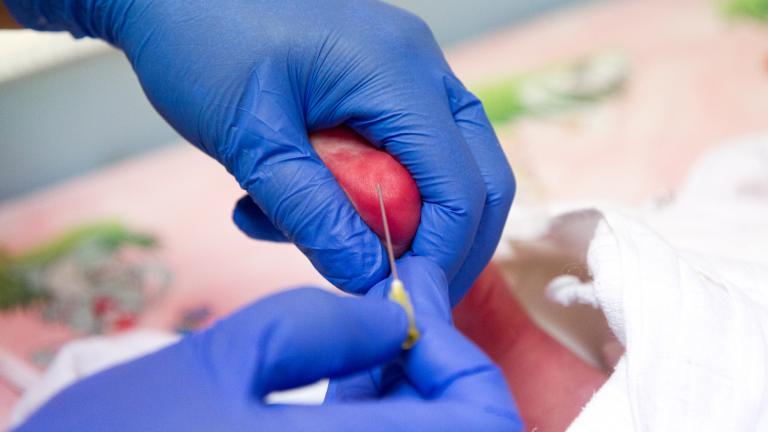Sickle cell disease is an inherited condition in which the red blood cells in your body are shaped like a sickle (like the letter C). Red blood cells carry oxygen to the rest of your body. In a healthy person, red blood cells are round and flexible. They flow easily in the blood.
If you have sickle cell disease it means that your red blood cells are stiff and can block blood flow. This can cause pain, infections and, sometimes, organ damage and strokes.
Sickle cell disease may lead to anemia which is a situation that happens when you do not have enough healthy red blood cells to carry oxygen to the rest of your body.
Sickle cell disease is genetic; this means it is passed from parent to child through genes. A gene is a part of your body’s cells that stores instructions for the way your body grows and works. Genes come in pairs and you get one of each pair from each parent.
To have sickle cell disease, a baby needs to inherit a gene change for sickle cell from both parents (SS) . If the baby inherits the gene change from just one parent, then the baby will have the sickle cell trait (AS) .
This means that although the baby has the gene change for sickle cell disease, the baby doesn’t actually have the disease. When this happens, such a baby is a carrier. A carrier has the gene change but doesn’t have the condition.
Sickle cell trait cannot become sickle cell disease and rarely do people with sickle cell trait show signs of sickle cell disease. Bur as a result of the possibility of passing sickle cell disease or sickle cell trait to your children, prenatal testing is essential. If you and your partner both have sickle cell disease (SS), your baby will also have the disease. However, if you and your partner both have sickle cell trait (AS), one of the following is possible:
- there’s a 3-in-4 chance (75 percent) that your baby won’t have sickle cell disease
- 1-in-2 chance (50 percent) that your baby will have sickle cell trait
- 1-in-4 chance (25 percent) that your baby will have sickle cell disease
- 1-in-4 chance (25 percent) that your baby won’t have sickle cell disease or sickle cell trait
The Unity test results are interpreted as Low-Risk or High Risk, where the result says low risk and the chances are further stated as maybe 1 in 5000 for instance, this means the baby has a 99% chance of not being SS.
However when the result says High-Risk, this means it is also 99% certain that the baby will be SS, In cases of High-Risk it will also come with a percentage like 1 in 3 etc, at this instance it means the baby has the chance of being SS.
A genetic counselor is trained to help you understand how genes, birth defects and other medical conditions run in families, and how they can affect your health and your baby’s health. It is advisable that you consult a genetic counselor.
It is not difficult to find out if you have sickle cell disease or sickle cell trait. If sickle cell disease or sickle cell trait runs in either of your families, the family health history is taken.
This is a record of any health conditions and treatments that you, your partner and everyone in both of your families have had.
Sickle cell disease is common in Nigeria and you can find out if your baby has either the disease or the sickle cell trait during pregnancy.
If you or your partner has either the sickle cell disease or the sickle cell trait, you can have a prenatal test to find out if your baby has inherited either disease.
If you or your partner has sickle cell disease (SS) or the sickle cell trait (AS) you can have a prenatal test to find out if your baby has either the disease or the trait. You can find out safely, quickly and accurately with the Unity Prenatal Test.
If you are pregnant and you and your spouse have AS genotype, you can go for the Unity Test that can enable you to find out if your unborn baby has inherited the sickle cell gene from both of you.
The Unity Test is carried out in Nigeria by Genomix. The test is beneficial to you and your unborn baby because it is a non-invasive blood test,
From just one tube of blood sample taken from you the mother, your status can be determined. If you are a carrier of the sickle cell gene (AS) the same blood sample will then be tested to determine the status of your unborn baby.
The Unity Test is the only test that screens mother and baby for sickle cell disease and four other commonly inherited conditions from a single tube of blood and it can help you to make decisions about a pregnancy depending on the result.
The procedure is affordable, simple, convenient, safe for mother and baby and the results are fast produced. It is a non-invasive test, only a tube of blood from the mother’s arm is required.
With the Unity Test, you can have access to safe, accurate and affordable prenatal screening for sickle cell disease. The test is 99 percent accurate for carrier screening for sickle cell disease.

